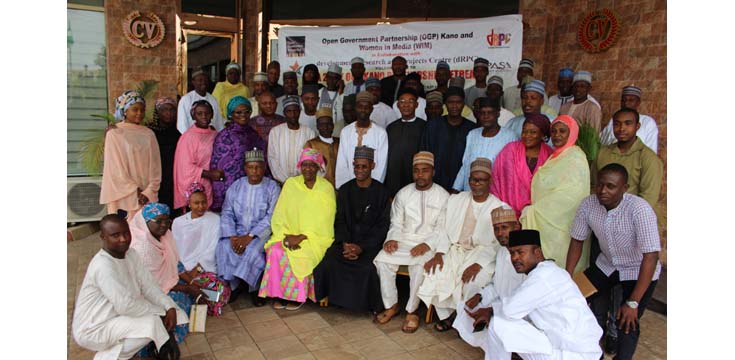OGP: Towards improved service delivery in Kano’s health, agric sectors
The Kano State Open Government Partnership (OGP) stakeholders, last week gathered in Abuja, for a two-day retreat aimed at understanding the Kano-OGP State Action Plan (KANSAP) and deliberating on strategies for resolving the missing links in the structure of the plan.

Apart from being Africa`s most populous nation, Nigeria is also among the continent`s top economies. However, the nation has been faced with many challenges including the ineffectual utilization of its vast natural resources for effective service delivery to drive its economic growth. Lack of openness, accountability, and corruption in governance has been identified as some of the major factors hindering Nigeria`s development.
As part of efforts to make governance more participatory, transparent and accountable, the Federal Republic of Nigeria during the Global Anti-Corruption Summit held at London in May 2016, requested to join the Open Government Partnership (OGP) – “an international platform for domestic reformers committed to making their governments more open, accountable, and responsive to citizens.”
Later on in June 2016, Nigeria formally joined the global OGP community as its 70th member nation. Also, following an Executive Order in August 2017, Kano state became the second subnational entity – after Kaduna – to formally join the OGP in Nigeria. Kano’s joining of the OGP was part of an effort to fight corruption by making governance more participatory and accountable.
It was against this backdrop that stakeholders in the Kano OGP process including state government officials, professional groups, civil societies, as well as members of the academia and the private sector gathered for a two-day retreat in Abuja last week. The retreat which was organized by the development Research and Projects Center (dRPC) and Women In Media (WIM) deliberated on the new Kano-OGP State Action Plan (2018 – 2020) including understanding its structure and identifying gaps in the Kano-OGP roadmap.
“The Kano-OGP State Action Plan (KANSAP) is a co-created document; to exist from September 2018 to August 2019 which came into being arising from mutual collaboration between State and Non-State Actors. It is to serve as a veritable tool for the implementation and realization of the agreed OGP commitments under the four key thematic areas in the state,” says Abba Danguguwa, Kano State Public Adviser on OGP.
Halima Ben Umar, Co-Chair of Kano OGP and Executive Director of WIM, while stating the objectives of the two-day retreat said, it was majorly aimed at validating an authorized OGP structure in line with the State Action Plan, and agreeing on the strategies for resolving any missing link in the structure so as to come up with an effective action plan for Kano state.
“As you are aware we have developed our costed Action Plan but we realized that there are a lot of gaps. For instance, looking at service delivery, we do not have commitments that relates to health – maternal and child, and agriculture. So, our main focus for the retreat is to fill in the gaps,” Ben Umar, told African Newspage.
Service delivery is one of the key thematic areas of the Kano-OGP State Action Plan which seeks to strengthen the operational capacity of the Kano SERVICOM Directorate to ensure strict compliance to service charters by Ministries Departments and Agencies (MDAs) and specifically address issues in four selected areas – health, agriculture, education, water and sanitation – by improving service delivery in these respective areas.
While speaking during a panel discussion on service delivery, Abdullahi Musa, Permanent Secretary at the Kano SERVICOM Directorate, said one of the gaps in the Kano-OGP State Action Plan was the absence of a service charter – a tool for institutionalizing the practice of good service delivery in MDAs and organizations – which he said would be critical in creating an effective synergy between the key thematic areas of the Kano-OGP State Action Plan.
During a panel session on service delivery gaps in health sector chaired by Ben Umar, she said: “The Kano State Action Plan is a rich document but some key issues are missing in the document especially the issues concerning women’s reproductive health. If you look at service delivery, we don’t have any specific activity that target women; therefore, we want to make sure there is inclusiveness in the health sector.”
Three major issues of concern were raised during the panel discussion on service delivery gaps in the Kano state health sector. These include Maternal and Child Health, Child Mortality and Morbidity Rates, Inadequate Primary Health Care Facilities and Health Training Institutions.
A panelist at the discussion, Hajiya Sa`a Nata`ala, the Kano state Reproductive Health and Family Planning Coordinator, said “multiple and early pregnancy as well as malnutrition among women and children remained a major health challenge in Kano.”
Umar Sa`id Tudun Wada, Managing Director of Radio Kano, who led a panel discussion on service delivery gaps in agriculture said the major gaps in agricultural service lamented the fact that agricultural inputs such as loans and seeds do not always get to farmers at the grassroots level. He therefore said the OGP anti-corruption commitment in the Kano Action Plan should ensure accountability in service delivery for the sector.
“The OGP process in Kano is gaining ground, we have made a lot of progress as far as the process of OGP in Kano state is concerned. We are happy with what have been done so far,” says Ibrahim Wayya, President of the Kano State Civil Society Forum while narrating his experience working with the Kano OGP process. “OGP concept is quite new to us. “However, it is a learning process, so we are equipping ourselves with skills and capacities on how to go about the implementation of the OGP principles and mandate in Kano.”









